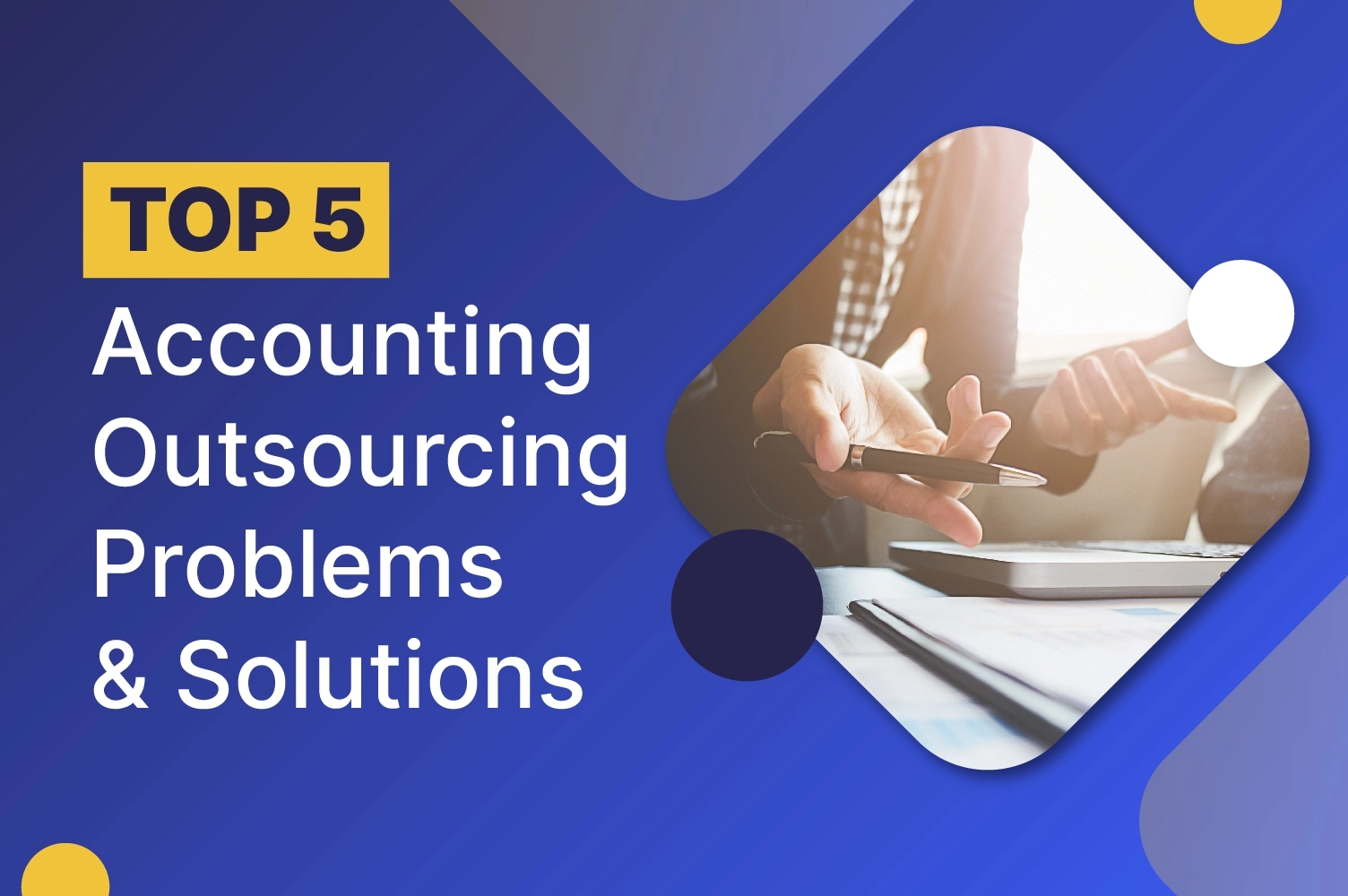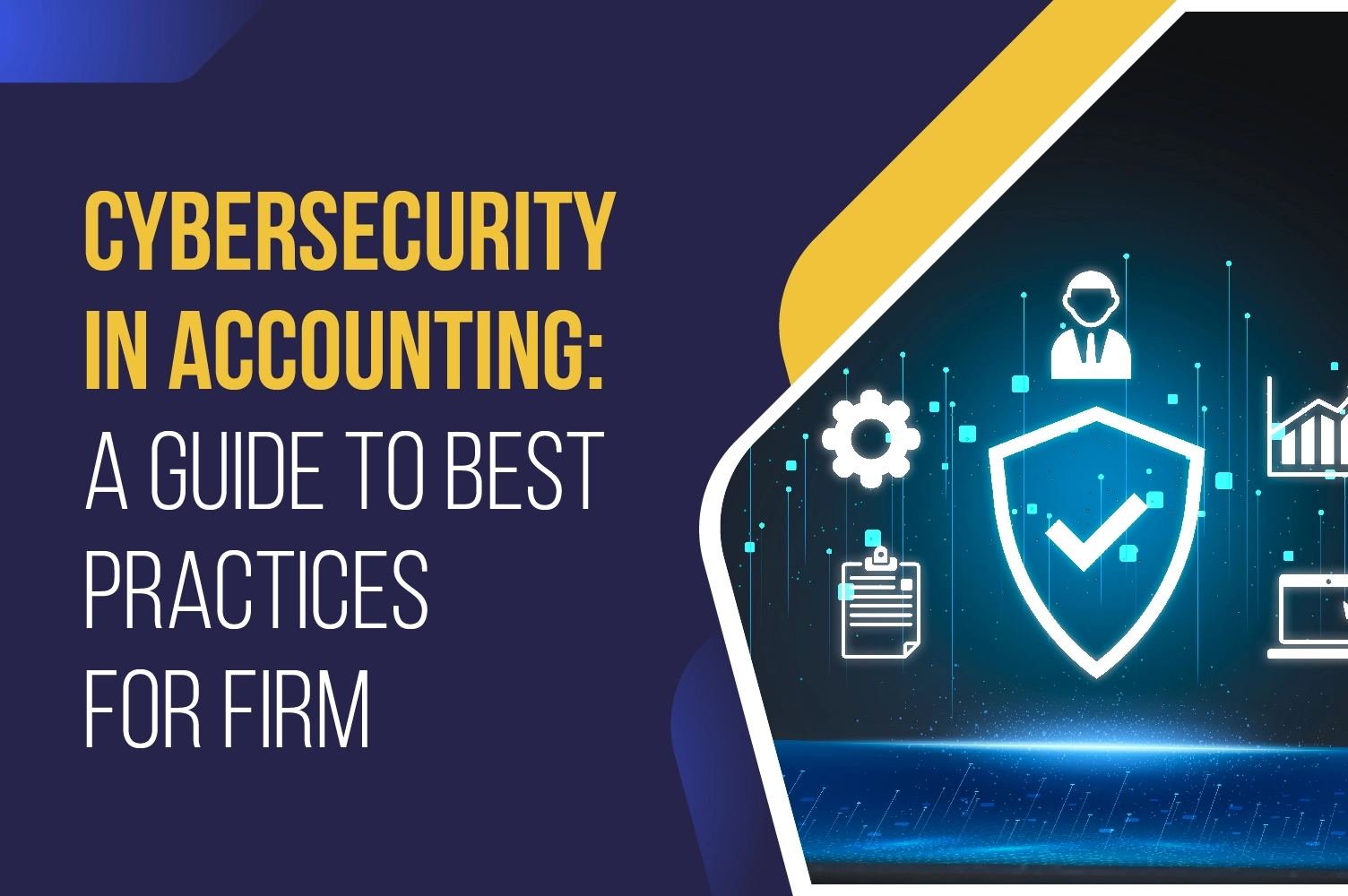- Home
- Blogs and Insights
- Cybersecurity Concerns for Accounting Firms
Cybersecurity Concerns for Accounting Firms
_1642676318-1686039629.webp) Christopher Rivera
Christopher Rivera- Nov 01, 2023
- 10 mins read
- 2901 views

I. Introduction
A. Navigating the Cybersecurity Threat Landscape
In a room filled with safes safeguarding sensitive data, the looming threat of cyber miscreants is ever-present. Today's cyber threats are not mere pranks; they are sophisticated, relentless, and damaging attempts by organized criminal rings or even state actors. Cybersecurity in accounting goes beyond traditional measures, requiring a comprehensive approach to safeguard sensitive information.
B. The Crucial Role of Data Security and Privacy for Accounting Firms
Accounting firms, the "bank vaults" of sensitive financial data, house heaps of critical information and play host to a plethora of bank account information, identification documents, tax identification numbers, and more. As guardians, they are responsible for ensuring data security and privacy to maintain their existence and the trust of their valued clients.
According to Accounting Today, accounting firms have seen a 300% increase in cyber attacks since the start of the pandemic in an industry that is already highly vulnerable to IT security threats.
C. Why Cybersecurity Matters for Accounting Firms
Accounting firms play a vital role in handling intricate financial blueprints. A breach can shatter lives and empires. Cybersecurity in accounting is not just a necessity; it's akin to understanding why locks matter to safes in a room full of treasures.
According to IBM and the Ponemon Institute’s 2021 Cost of a Data Breach report, professional services such as accounting firms can reach an average cost of $4.65 million/data breach, with lost business accounting for 38% of the total data breach cost.
Accounting firms, in particular, because of the sensitive nature of the data they collect and process, can take a massive reputational hit in the wake of a data breach, which can result in a loss of client trust and discouragement of new clients. It is, therefore, very important for accounting firms to have security measures in place to protect client data.
II. Understanding the Importance of Data Security and Privacy in Accounting
A. The Foundation: Importance of Client Trust in Accounting
A secure book is not merely about compliance; it's about maintaining the trust built with clients over numerous interactions. Like choosing a bank for precious jewels, clients rely on accounting firms to protect their sensitive financial data.
B. Counting the Cost: Financial Implications of Data Breaches
According to IBM's Cost of a Data Breach report, a data breach is akin to having a hole in your pocket, with an average cost of $3.86 million per breach. Beyond financial losses, there's the erosion of customer trust, emphasizing the need for cybersecurity as a stabilizing force.
C. Legal and Regulatory Obligations for Accounting Firms
In the era of privacy legislations like GDPR and CCPA, accounting firms must align with government regulations mandating stringent data privacy practices. Non-compliance could lead to severe consequences, making legal and regulatory adherence crucial.
III. Key Cybersecurity Threats Faced by Accounting Firms
While Understanding Cybersecurity Concerns for Accounting Firms, you learn that accounting firms face unique challenges when it comes to cybersecurity concerns. The risk of unauthorized access, data breaches, and financial fraud are constant threats that require proactive measures. Here are some examples of How Do Cyber Threats Affect Accounting Firms.
A. Phishing Attacks and Fraudulent Emails
Accounting firms face a daily deluge of phishing attacks, cleverly disguised as innocent emails or cleanup requests. The goal is to lure unsuspecting employees into revealing passwords or confidential information.
B. Ransomware Attacks: Understanding the Threat
Ransomware attacks put accounting firms in a precarious position, with hackers demanding a ransom for the release of crucial data. The ethical dilemma involves either paying the ransom or risking the loss of essential information.
C. Insider Threats to Data Security
Insider threats, whether deliberate or unintentional, pose a significant risk. It includes deliberate saboteurs and well-intentioned employees compromising data through risky actions.
IV. Best Practices for Maintaining Data Security and Privacy in Accounting Firms
The seamless integration of accounting and cybersecurity is crucial for maintaining the trust and integrity of financial information. By adopting advanced security protocols, firms can protect themselves from evolving cyber threats.
Combining accounting and cybersecurity involves implementing a strategic and multi-layered approach. Here are key steps to fortify your firm's defenses:
A. Implementing Robust Security Policies and Protocols
Identify potential vulnerabilities in your accounting systems by conducting a thorough risk assessment. Highlighting weak points in your cybersecurity framework will allow you to address them proactively. Then, accounting firms must establish robust security protocols and formulate comprehensive cybersecurity policies addressing threat identification, data access controls, and disaster recovery plans.
B. Investing in Cybersecurity Infrastructure and Tools
A genuinely secure cybersecurity infrastructure equipped with end-to-end encryption, multi-factor authentication, and advanced detection systems is essential. Investing in state-of-the-art cybersecurity tools is a strategic imperative.
C. Regular Employee Training and Awareness Programs
Regular training sessions and awareness programs are vital. Ensuring every employee is educated about identifying and handling cybersecurity threats is crucial for maintaining a strong defense.
V. Case Studies: Lessons from Firms That Have Experienced Cyber Attacks
A. Chain Reaction
In a recent incident, a global accounting software provider fell victim to a sophisticated malware attack, causing a widespread impact on various business platforms. The attack temporarily compelled the firm to take down several of its cloud-based software applications.
Although service restoration efforts spanned a challenging six-day period, a comprehensive investigation was initiated. This unfortunate event led to significant disruptions and delays for the firm's accounting clients, impeding their ability to access crucial client data.
B. Taxing Issue
Highlighting the ever-evolving threat landscape, a seasoned tax professional faced a cunning email phishing attack. Despite the accountant's experience and training in identifying phishing attempts, the cybercriminal's tactics proved highly deceptive.
The fraudulent email, cleverly disguised as a client communication, lured the tax professional into opening an attachment. This seemingly innocuous action unleashed malware into the computer system, enabling the cybercriminal to pilfer sensitive information. The aftermath saw unauthorized access to bank accounts and the propagation of further fraudulent emails, cunningly disguised as legitimate communications from the accountant.
C. The Value of Data
Even global giants are not immune. Deloitte, a renowned accounting firm, encountered a severe disruption when cybercriminals successfully hacked into its email system, compromising data related to 350 clients.
In response to this breach, Deloitte promptly reviewed its security protocols comprehensively. A dedicated team of cybersecurity and confidentiality experts worked tirelessly to fortify the firm's defenses against future threats, underlining the critical importance of safeguarding sensitive client information in today's digital landscape.
VI. Navigating Future Cybersecurity Challenges: A Way Forward for Accounting Firms
A. Staying Ahead: Predicting and Preparing for the Evolving Cybersecurity Landscape
Cybersecurity concerns for accounting firms have become inevitable. As artificial intelligence and machine learning technologies evolve, so do cybersecurity threats. Accounting firms must predict potential threats and be ready to adapt to new security practices to stay one step ahead.
B. Regulatory Compass: Role of Government Regulations in Shaping Data Security Measures
Governments provide regulations to keep everyone's data safe. As regulatory structures evolve to address emerging threats, accounting firms must adapt their security measures accordingly.
C. Technological Arsenal: Leveraging Technologies for Enhanced Data Security
Technology is a double-edged sword, posing challenges in the form of advanced cyber threats but also equipping businesses with sophisticated tools. Accounting firms must leverage AI, machine learning, and blockchain to enhance data security.
Summary
The synergy between accounting and cybersecurity is indispensable in today's digital landscape. By proactively addressing cybersecurity concerns and implementing robust measures, accounting firms can safeguard their financial data and protect the trust of their clients. Prioritizing cybersecurity in accounting is not just a necessity; it is a responsibility in the digital era.
A. Key Cybersecurity Considerations for Accounting Firms
Regulatory compliance, the evolving threat landscape, customer trust, and technological advancements are crucial factors for crafting a foolproof data security strategy for accounting firms.
B. Best Practices for Data Security and Privacy
To ensure a foolproof security system, accounting firms must adopt best practices such as implementing solid security policies, investing in advanced security tools, and holding regular employee training programs. Seal your firm's digital fortress, and hold the keys close to your chest.
FAQs
A. What are the most common cyber threats for accounting firms?
Phishing attacks, ransomware, insider threats, and various malware and hacking techniques form a challenging "rogue's gallery" of cyber threats faced by accounting firms.
B. What are the strategies for mitigating risks in the cybersecurity arena?
Outsmarting cyber threats requires a multi-pronged strategy, including robust security policies, a strong cybersecurity infrastructure, regular employee training, and adherence to regulatory data security standards.
C. What are the potential ramifications of data breaches?
The consequences of data breaches for accounting firms include regulatory penalties, significant financial loss, client mistrust, and potential harm to the firm's reputation. It's a high-stakes battle where any slack can lead to a steep downward spiral.
D: Why is cybersecurity crucial for accounting firms?
Cybersecurity is paramount for accounting firms due to the escalating threat landscape. With a 300% surge in cyber attacks, protecting sensitive financial data is imperative. Breaches not only incur an average cost of $4.65 million but also jeopardize client trust, making robust security measures a necessity in the digital era.
E: What are the key cybersecurity threats faced by accounting firms?
Accounting firms grapple with pervasive cybersecurity threats, including phishing attacks exploiting unsuspecting employees, ransomware jeopardizing crucial data, and insider threats posing significant risks. Proactive measures are essential to thwart these constant menaces.
F: How can accounting firms enhance data security and privacy?
Strengthening data security in accounting demands a strategic approach. By implementing robust security policies, investing in advanced cybersecurity infrastructure, and conducting regular employee training, firms can fortify defenses against evolving cyber threats and protect sensitive client information.
Entigrity™ is a trusted offshore staffing partner for 725+ accountants, CPAs, and tax firms across the US and Canada. With a flexible and transparent hiring model, the company empowers firms of all sizes to acquire skilled accounting, bookkeeping, and tax preparation staff. As a firm 'run by accountants, for the accountants,' Entigrity ensures precise alignment with the hiring needs of accounting firms, providing staff under your control and management, minimizing concerns about compliance, payroll taxes, overheads, or benefits. Entigrity is a proud independent member of the BDO Alliance USA. We have collaborated with IMA to train and upskill 5,000 Professionals in India. We were also recognized as one of the "Dream Companies to Work For" and won the "Great Place to Work® Certified™" in the accounting offshoring industry.
Christopher Rivera
Director, Client RelationsChristopher Rivera, Chris serves as a Director of Client Relations and Business Development at Entigrity. He is an expert at leading and managing teams actively from the front. His expertise in sales, training, coaching, mentoring and influencing combined with his competitive nature makes him a strong leader. Chris has traveled through the length and width of the country and has spoken with more than five thousand CPAs, understanding their challenges and limitations. On the grounds of that, he can now easily provide opinions and solutions that can be immensely helpful to the professionals. He has also represented Entigrity at a number of major accounting conferences and networking events.



 +1-646-827-4348
+1-646-827-4348 +1-646-827-4348
+1-646-827-4348 +44-(0)20-3355-7340
+44-(0)20-3355-7340
























-1698666312.webp)


